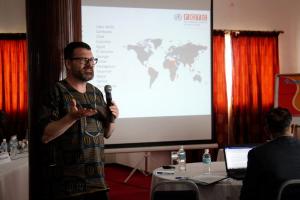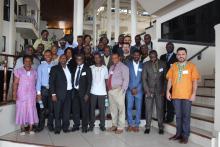Sierra Leone to accelerate action on tobacco control with support from the United Nations
FREETOWN, 13 February 2018 --- Senior global officials from the World Health Organization Framework Convention on Tobacco Control (WHO FCTC) Secretariat, WHO and the United Nations Development Programme have joined Sierra Leone's Ministry of Health and Sanitation in calling for accelerated action to reduce tobacco consumption in the country. The call was made at a major national meeting of stakeholders in the capital, Freetown today.
There are an estimated 640,000 tobacco users in Sierra Leone and smoking prevalence is increasing, particularly among men and youth. Its use is extremely harmful for health and tobacco is one of the world’s leading causes of premature death. Tobacco kills half of all long-term smokers from many different noncommunicable diseases, including cancer, lung and heart disease.
Tobacco is also a major barrier to development, bringing vast economic, social and environmental costs to individuals and counties. The World Bank says that tobacco costs the global economy an estimated US $1.4 trillion each year through treatment of sicknesses, and lost productivity.
“Tobacco not only steals lives; it exacerbates poverty, damages the environment, and creates immense burdens on national health systems,” said Andrew Black, Development Assistance Team Leader from the FCTC 2030 Secretariat, who is visiting Sierra Leone this week from Geneva. “As we move towards accelerated implementation of the WHO FCTC, we look forward to continuing our work with the Government and partners in tackling the growing prevalence of tobacco use in Sierra Leone.”
In March 2017, Sierra Leone became one of just 15 low and middle-income countries to benefit from the FCTC 2030 Project. Led by the Secretariat of the WHO FCTC in collaboration with WHO and UNDP, FCTC 2030 provides intensive support to governments so that they can implement effective, evidence-based tobacco control measures. The project is generously funded by the UK and Australian governments.
Such tobacco control measures include: bans on tobacco advertising and sponsorship; creation of smoke-free public and work places; effective health warnings for all tobacco packaging; restricting sales of tobacco products to minors; public awareness campaigns, and strengthened tobacco taxation.
“Tobacco use is projected to increase in Sierra Leone, and we call for all hands on deck, from government ministries to policy makers, the private sector and civil society to urgently protect our people from this growing threat,” said Dr. Alie Wurie, Director of Noncommunicable Diseases and Mental Health in Sierra Leone. “Through the duration of this project and beyond, the Ministry of Health and Sanitation will make tobacco control a national priority, through prevention, legislation and education of the public on tobacco’s health dangers and costs.”
“The Government of Sierra Leone has just passed a law for a 30 percent excise tax on tobacco products, which is a major win for pubic health,” he added. “It has also established a dedicated multi-sectoral tobacco control task force, which will support finalization and implementation of a new national strategy for tobacco control in Sierra Leone.”
“While joining the FCTC 2030 is a huge opportunity for Sierra Leone, there is still growing consumption of tobacco in the country which puts the health and wellbeing of users and their families at risk. Without urgent action, tobacco will place an increasingly heavy toll on Sierra Leone’s healthcare system,” said Alexander Chimbaru, Officer in Charge at WHO Sierra Leone.
Globally, tobacco kills more than 7 million people each year. More than 6 million of those deaths are the result of direct tobacco use, while around 890,000 are attributed to exposure to second-hand smoke.
###
Notes for Editors
About the WHO Framework Convention on Tobacco Control
The WHO Framework Convention on Tobacco Control (WHO FCTC) is an international treaty that is dedicated to ending the global tobacco epidemic, and provides a comprehensive blueprint for governments to stop tobacco use in their countries.
Some 181 countries are Parties to the WHO FCTC, meaning that the treaty covers more than 90% of the world’s population. Sierra Leone became a Party to the WHO FCTC in 2009.
The WHO FCTC is a milestone in the promotion of public health. It is an evidence-based treaty that reaffirms the right of people to the highest standard of health, provides legal dimensions for international health cooperation and sets high standards for compliance.
About the FCTC 2030 Project
The FCTC 2030 project aims to support Parties to the WHO FCTC that are eligible to receive official development assistance (ODA) to achieve the Sustainable Development Goals by advancing implementation of the Convention. The project will run from April 2017 until March 2021.
The 15 countries selected to participate in the project are:
Cabo Verde, Cambodia, Chad, Colombia, Egypt, El Savador, Georgia, Jordan, Madagascar, Myanmar, Nepal, Samoa, Sierra Leone, Sri Lanka and Zambia.
Contacts
At WHO: Laura Keenan, keenanl [at] who.int, +232 786 33 952
At MoHS: Kadri Koroma, kadriekoroma [at] yahoo.com, +232 76 672 962




